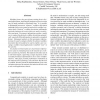Free Online Productivity Tools
i2Speak
i2Symbol
i2OCR
iTex2Img
iWeb2Print
iWeb2Shot
i2Type
iPdf2Split
iPdf2Merge
i2Bopomofo
i2Arabic
i2Style
i2Image
i2PDF
iLatex2Rtf
Sci2ools
EDOC
2006
IEEE
2006
IEEE
Trust Assessment Using Provenance in Service Oriented Applications
Workflow forms a key part of many existing Service Oriented applications, involving the integration of services that may be made available at distributed sites. It is possible nguish between an “abstract” workflow description outlining which services must be involved in a workflow execution and a “physical” workflow description outlining the particular instances of services that were used in a particular enactment. Provenance information provides a useful way to capture the physical workflow description automatically especially if this information is captured in a standard format. Subsequent analysis on this provenance informabe used to evaluate whether the abstract workflow description has been adhered to, and to enable a user executing a workflow-based application to establish “trust” in the outcome. An analysis tool that makes use of provenance information to assist in evaluating trust in the outcome of a workflow execution is presented. The analysis tool makes ...
| Added | 11 Jun 2010 |
| Updated | 11 Jun 2010 |
| Type | Conference |
| Year | 2006 |
| Where | EDOC |
| Authors | Shrija Rajbhandari, Arnaud Contes, Omer F. Rana, Vikas Deora, Ian Wootten |
Comments (0)

